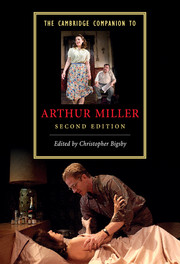Book contents
- Frontmatter
- 1 Introduction
- 2 The tradition of social drama
- 3 The early plays
- 4 All My Sons
- 5 Death of a Salesman and the poetics of Arthur Miller
- 6 Conscience and community in An Enemy of the People and The Crucible
- 7 A View from the Bridge
- 8 The Holocaust, the Depression, and McCarthyism
- 9 Miller’s 19s “power” plays
- 10 Miller in the eighties
- 11 The last plays
- 12 Arthur Miller and the cinema
- 13 Arthur Miller’s fiction
- 14 Critic, criticism, critics
- 15 Arthur Miller
- Index
- Cambridge Companions To ...
12 - Arthur Miller and the cinema
Published online by Cambridge University Press: 28 March 2011
- Frontmatter
- 1 Introduction
- 2 The tradition of social drama
- 3 The early plays
- 4 All My Sons
- 5 Death of a Salesman and the poetics of Arthur Miller
- 6 Conscience and community in An Enemy of the People and The Crucible
- 7 A View from the Bridge
- 8 The Holocaust, the Depression, and McCarthyism
- 9 Miller’s 19s “power” plays
- 10 Miller in the eighties
- 11 The last plays
- 12 Arthur Miller and the cinema
- 13 Arthur Miller’s fiction
- 14 Critic, criticism, critics
- 15 Arthur Miller
- Index
- Cambridge Companions To ...
Summary
Since his first Broadway success, commercial filmmakers, in the US and abroad, have shown great interest in the works, especially the plays but also the prose fiction, of Arthur Miller. There are in fact, as of May 2009, some seventy-two films based in some sense on his writings (if we include productions on which he has worked in some capacity as a writer but not, strictly speaking, as the author of an adapted property). More than half of these films, some forty-one, were made and exhibited in Europe, a telling indication of the playwright’s international reputation, which shows every sign of strengthening in the twenty-first century.
Miller’s works, no doubt, remain an important source for filmmakers. A screen version of The Man Who Had All the Luck (produced on Broadway in 1944 and successfully revived in 2002) is at this writing in production, directed by Scott Ellis, who was responsible for the recent New York stage production. And currently in development is a new film version of A View from the Bridge (produced on Broadway in 1955 and with a very successful British production in 2009). The film is reportedly to be directed by major Hollywood player Barry Levinson and to star Scarlett Johansson, Frances McDormand, and Anthony LaPaglia, three of the current American independent cinema’s most respected performers. On the one hand, such enthusiasm for Miller is neither surprising nor exceptional.
- Type
- Chapter
- Information
- The Cambridge Companion to Arthur Miller , pp. 200 - 233Publisher: Cambridge University PressPrint publication year: 2010
- 1
- Cited by



